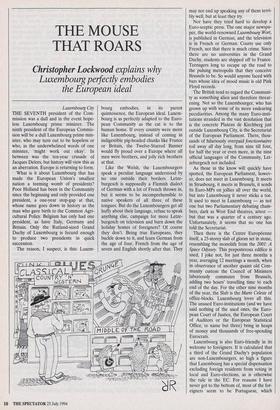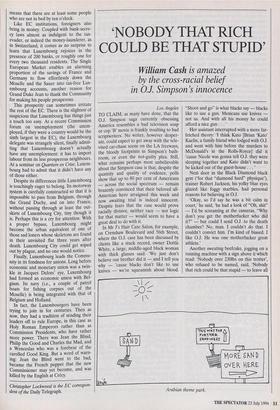THE MOUSE THAT ROARS
Christopher Lockwood explains why
Luxembourg perfectly embodies the European ideal
Luxembourg City THE SEVENTH president of the Com- mission was a dull and in the event hope- less Luxembourg prime minister. The ninth president of the European Commis- sion will be a dull Luxembourg prime min- ister, who may turn out to be hopeless or who, in the underwhelmed words of one minister, 'might work out okay'. In between was the ten-year crusade of Jacques Delors, but history will view this as an aberration. Europe is returning to form.
What is it about Luxembourg that has made the European Union's smallest nation a teeming womb of presidents? Poor Holland has been in the Community since the beginning and only provided one president, a one-year stop-gap at that, whose name goes down in history as the man who gave birth to the Common Agri- cultural Policy. Belgium has only had one president, as have Italy, Germany and Britain. Only the Rutland-sized Grand Duchy of Luxembourg is fecund enough to produce two presidents in quick succession.
The reason, I suspect, is this: Luxem- bourg embodies, in its purest quintessence, the European ideal. Luxem- bourg is as perfectly adapted to the Euro- pean Community as the cat is to the human home. If every country were more like Luxembourg, instead of coming in indigestible pig-headed chunks like France or Britain, the Twelve-Starred Banner would fly proud over a Europe where all men were brothers, and jolly rich brothers at that.
Like the Welsh, the Luxembourgers speak a peculiar language understood by no one outside their borders. Letze- burgesch is supposedly a Flemish dialect of German with a lot of French thrown in, but it seems to be incomprehensible to native speakers of all three. of these tongues. But do the Luxembourgers get all huffy about their language, refuse to speak anything else, campaign for more Letze- burgesch on television and burn down the holiday homes of foreigners? Of course they don't. Being true Europeans, they buckle down to it, and learn German from the age of four, French from the age of seven and English shortly after that. They may not end up speaking any of them terri- bly well, but at least they try.
Nor have they tried hard to develop a Euro-sceptic press. The one major newspa- per, the world-renowned Luxembourg Wort, is published in German, and the television is in French or German. Courts use only French, not that there is much crime. Since there are no universities in the Grand Duchy, students are shipped off to France. Teenagers long to escape up the road to the pulsing metropolis that they conceive Brussels to be. So would anyone faced with bars whose idea of mood music is old Pink Floyd records.
The British tend to regard the Communi- ty as something alien and therefore threat- ening. Not so the Luxembourger, who has grown up with some of its more endearing peculiarities. Among the many Euro-insti- tutions stranded in the vast desolation that is the concrete Plateau de Kirchberg just outside Luxembourg City, is the Secretariat of the European Parliament. There, thou- sands of hilariously overpaid fonctionnaires toil away all day long, from nine till four, for half the year or even more, in the nine official languages of the Community, Let- zeburgesch not included.
As those in the know will quickly have spotted, the European Parliament, howev- er, does not meet in Luxembourg. It meets in Strasbourg, it meets in Brussels, it sends its Euro-MPs on jollies all over the world, but into Luxembourg it never sticks a toe. It used to meet in Luxembourg — as not one but two Parliamentary debating cham- bers, dark as West End theatres, attest — but that was a quarter of a century ago. Unfortunately, it seems that no one has told the Secretariat.
Then there is the Centre Europeenne itself, a 25-storey slab of gloom set in stone, resembling the monolith from the 2001: A Space Odyssey. This preposterous edifice is used, I joke not, for just three months a year, averaging 12 meetings a month, when in observance of another quaint old Com- munity custom the Council of Ministers laboriously commutes from Brussels, adding two hours' travelling time to each end of the day. For the other nine months of the year, the Slab is the Marie Celeste of office-blocks. Luxembourg loves all this. The unused Euro-institutions (and we have said nothing of the used ones, the Euro- pean Court of Justice, the European Court of Auditors or the European Statistical Office, to name but three) bring in heaps of money and thousands of free-spending Eurocrats.
Luxembourg is also Euro-friendly in its welcome to foreigners. It is calculated that a third of the Grand Duchy's population are non-Luxembourgers, so high a figure that Luxembourg has a special dispensation excluding foreign residents from voting in local and Euro-elections, as is otherwise the rule in the EC. For reasons I have never got to the bottom of, most of the for- eigners seem to be Portuguese, which means that there are at least some people who are not in bed by ten o'clock.
Like EC institutions, foreigners also bring in money. Coupled with bank-secre- cy laws almost as indulgent to the tax- evader, or indeed the money-launderer, as in Switzerland, it comes as no surprise to learn that Luxembourg rejoices in the presence of 200 banks, or roughly one for every two thousand residents. The Single European Market enables an alarming proportion of the savings of France and Germany to flow effortlessly down the Moselle and the Sauer into tax-free Lux- embourg accounts, another reason for Grand Duke Jean to thank the Community for making his people prosperous.
This prosperity can sometimes irritate the rest of the EC. There is the slightest of suspicions that Luxembourg has things just a touch too easy. At a recent Commission forum on unemployment (the unem- ployed, if they were a country would be the sixth largest in the EC), the Luxembourg delegate was strangely silent, finally admit- ting that Luxembourg doesn't actually have any unemployment: it has to import labour from its less prosperous neighbours. At a seminar on Quartiers en Crise, Luxem- bourg had to admit that it didn't have any of those either.
Despite its differences little Luxembourg is touchingly eager to belong. Its motorway system is carefully constructed so that it is impossible to pass from Belgium, through the Grand Duchy, and on into France, without passing through at least the out- skirts of Luxembourg City, tiny though it is. Perhaps this is a cry for attention. With a proper bypass, Luxembourg might become the urban equivalent of one of those sad loners whose skeletons are found in their unvisited flat three years after death. Luxembourg City could get wiped out by plague, and no one would notice.
Finally, Luxembourg leads the Commu- nity in its fondness for unions. Long before economic and monetary union was a twin- kle in Jacques Delors' eye, Luxembourg had formed an economic union with Bel- gium. Its navy (i.e., a couple of patrol boats for fishing corpses out of the Moselle) is being integrated with that of Belgium and Holland. In fact, the Luxembourgers have been trying to join in for centuries. Then as now, they had a tradition of sending their leaders off to rule Europe, in this case as Holy Roman Emperors rather than as Commission Presidents, who have rather more power. There was Jean the Blind, Philip the Good and Charles the Mad, and a Wenceslas who was a forebear of the carolled Good King. But a word of warn- ing: Jean the Blind went to the bad, became the French puppet that the new Commissioner may yet become, and was killed by the English at Crecy.
Christopher Lockwood is the EC correspon- dent of the Daily Telegraph.



















































 Previous page
Previous page